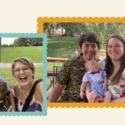Chelsea Hottovy remembers the moment she realized she didn’t want children.
At 23 years old, she held an office job where all seven women in her immediate vicinity were mothers. Some had newborns. Others had grandkids. During one nondescript weekday, her coworkers were casually chatting about the ups and downs of motherhood. Outwardly, she smiled and laughed along with them — but inside, she was coming to a monumental realization.
“I did not want to have these stories. I didn’t want to deal with those things,” Hottovy said. “No part of me longed to be a part of that club. Nothing inside of me was calling to have that experience. It was the first time that I’d consciously thought about it for my own self, and I didn’t want it, and not for a single second in my life since have I ever wavered from that.”
For Hottovy, now 37, it was a shocking epiphany. She was raised religiously, and while no one had explicitly told her that girls grow up to have babies, “the implication was strong enough that no other option occurred to me.”
“It was like a floodlight turned on and at the same time a thousand pieces fell into place and also the blinders came off and it felt more right than anything,” Hottovy said. “Since coming into that realization, I have only added to the list of reasons — environmental, fiscal, independence, etc. — but once I knew it just wasn’t something that I wanted, I didn’t need to examine it further. I just knew.”
She isn’t alone. A growing number of millennials and Generation Z are opting out of parenthood, a decision often referred to as “staying child-free by choice.”
Birth Rate Declines Under Millennials
Though birth rates have always fluctuated, often along with economic conditions, the recent decline in the U.S. birth rate confounded many demographers. It has fallen by 20% since 2007, according to data collected from CDC Vital Statistics Reports.
In her 40-year reporting career at Deseret News, Lois M. Collins has spent more than a decade covering public policy and research that impacts families — including interviews with demographers studying the U.S. birth rate.
“Birthrates have been shrinking overall for some time in the U.S., with some bobbles up and then back down that never seem to last,” Collins said. “The replacement rate is 2.1 and the U.S. overall is about 1.78. So the population is going to shrink unless more people have kids or people have more kids.”
The replacement rate, or total fertility rate, is the birth rate required to maintain a population’s current size. Replacement rates higher than 2.1 indicate population growth, while rates lower than 2.1 indicate population decline. The last time the U.S. had a replacement rate of 2.1 or higher was in 2009, despite demographers’ predictions of a recovery after the recession.
“What I have learned from talking to lots of experts is that the cost of having a family is a big factor,” Collins said. “High rents, inflation (which is relatively new in this trend), student debt, etc. give young adults the sense they should wait. And the longer they wait, the fewer children they have. That part is simple math.”
According to Pew Research Center data from 2021, 44% of non-parents ages 18 to 49 said it was not too likely or not at all likely that they would have children someday — an increase of seven percentage points from the 37% who said the same in a 2018 survey. And much like Hottovy, “a majority (56%) of non-parents younger than 50 who say it’s unlikely they will have children someday say they just don’t want to have kids.”
“I absolutely don’t think being child-free by choice was a common thing for previous generations,” Hottovy said. “Even if there were many women who didn’t want kids for whatever reason, they weren’t able to find each other or have any community or support without the internet, so they may have just had kids because that was what you were supposed to do and everyone around them was doing the same. Now that we have the resources to connect with one another, it’s got to be much easier to be more honest about individual choices, be that parenthood or not.”

Zoomers Continue the Trend
While an increasing number of young adults are choosing to stay child-free, their reasons for doing so are as diverse as they are.
Drake University student Emma Ketelsen, 20, began thinking about remaining child-free when a friend started chatting with her one day in high school about her own decision not to have kids.
“A lot of it was my sexuality, and then some of it was financials,” Ketelsen said. “And then a lot of it was, I just don’t want to go through that with my body and all the side effects I would go through.”
Similarly, 21-year-old Drake student Ryan Pont remembers first thinking about the option to remain child-free during his sophomore year of high school.
“Some of the factors I kind of looked at were what my parents had to go through raising me and my sisters and if I could do that, especially with all these societal issues,” Pont said. “And I think I’d mess it up. The main thing is, I don’t want to bring a child into this world and then just royally screw them up.”
The “usual kid stuff” his parents went through — misbehavior, temper tantrums, navigating the American education system — is just not something Pont could see himself doing.
“As for the societal problems, global warming is a big one, the increase in extreme political identity, just general signs pointing towards a less promising future,” Pont said. “I don’t want to bring a kid into the world just to have them deal with society’s collapse.”
Pont estimates that around 80% of his friend group, largely his age, have chosen to remain child-free. In Ketelsen’s friend group, she estimates it’s about a 50/50 split. Both said financial concerns were commonly cited among their friends and peers as a reason to reject parenthood.
“I think there will be more people who remain child-free by choice, not just because of our generation pushing back on social norms and stuff,” Ketelsen said. “But also, it’s getting harder and harder to afford just basic living, let alone the finances it takes to raise a child. A lot of our generation isn’t going to be able to own a home, let alone take care of another living being.”
Even Zillennials, those around the ages of 20 to 27, with children understand why some of their peers are forgoing parenthood. Jacinda Nava Romero, 24 of Des Moines, always knew she wanted kids and cherishes her two-month-old son — but she respects and supports her friends who choose a different path.
“I feel like our friends range anywhere from like 21 to almost 30 years old and we’re the only ones in our close circle that have a child,” Nava Romero said. “With how the world is like, what the political climate is like, that doesn’t really surprise me. And things are just so expensive now, too.”
Child-Free Trends in the Future
There are a variety of reasons why a growing number of young adults are remaining child-free, but the impact remains the same. Demographers predict the U.S. birth rate will continue to trend below the replacement level for the foreseeable future.
Hottovy believes more people will choose to remain child-free in the future, and “a lot of social circumstances had to collide to get us to this particular place.”
“I think the dream that my generation was sold is starting to dissolve as we grapple with the reality of the world and how we want to live in it,” Hottovy said. “I was told that if I just went to college, everything would sort of fall into place after — the white picket fence, the 2.5 kids, the hefty retirement fund, perhaps a boat or vacation home. That obviously simply isn’t true any longer, and I think my generation is coming to terms with that.”
Despite a shift toward acceptance in younger generations, there are still barriers to young adults when choosing whether or not to have children.
“I think that the only true criticism I’ve ever faced was from the several doctors who refused to respect my life choices as I was looking to get my tubal ligation,” Hottovy said.
Others face criticism from family or acquaintances. Pont has often been told by a family member that “it’s my destiny to be a father.”
“Because I’m 20, people always treat it like, ‘That’s just something you want right now. You’re just stressed and going through school and stuff, of course, you’re not thinking about kids right now,’” Ketelsen said. “Even when I talked to my dad about it, he was like, ‘Oh, you just haven’t found the right person. You’re just young.’”
Despite some social pressure remaining from the expectations of older generations, Hottovy believes younger generations feel freer to choose their own paths in life.
“I think there’s much more of a fuck-it attitude now on several different levels,” Hottovy said. “A bit of nihilism — do whatever you want, the oceans are literally on fire, so who cares? A bit of empowerment — my body, my choice. A bit of independence — why the shit do I care what other people want me to do with my life when it’s mine to live?”
Hottovy — who has a partner, a dog and the flexibility to travel anywhere from Argentina to Antarctica — has never regretted her decision to remain child-free. But she wants people to know she loves kids and “utterly adore my nieces and nephews.”“I am literally so excited to go to first birthday parties and want to see all the pictures and videos and love to hang out with my lil buddies and send them amazing souvenirs from my travels. I just do not want to have any of my own,” Hottovy said. “Some folks do assume I’m some child-hating troll and it’s just not true. I’m fascinated by space but I don’t want to be an astronaut, you know? Same idea.”

